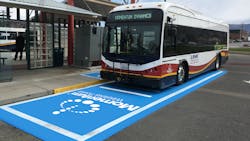Momentum Dynamics and Link Transit extend electric bus wireless charging agreement through five-year contract
Link Transit has extended its partnership with Momentum Dynamics through a five-year contract following the successful introduction and operation of a wirelessly charged bus in 2019.
Through this partnership, Momentum Dynamics will provide further charging systems and ongoing services for Link Transit's growing fleet of electric buses.
Link Transit and Momentum say they share the state of Washington's desire to reduce carbon emissions and the transit company plans to migrate to emissions-free electric buses as soon as possible. Link Transit's fleet electrification plan includes route expansion, increased on-route frequency of service, strategic upgrades to electrify its bus fleet and a new suite of online ridership tools. As part of this plan, Link will add 10 new electric buses to its fleet in 2020, all of which will be fitted with Momentum Dynamics' wireless charging receivers. As part of the agreement, Momentum will provide three new on-route charging stations, each capable of delivering 300kW.
"Automated wireless charging is a transformative technology," said Momentum CEO Andrew Daga. "Wireless charging is extremely effective in operation and means that electric buses can now drive any route, without range anxiety, while maintaining an adequate energy reserve under all weather conditions. The extension of our relationship with Link Transit amply demonstrates that, and we are proud to partner with Link well into the future."
In 2018, Link Transit commissioned the nation's first 200-kilowatt wireless charging system for a battery-electric transit bus from Momentum Dynamics, according to the company. The system has been operational on a BYD K9S bus since then. Since installation, the system has delivered an total power of 41 MWh for its vehicle charging. Recently, Momentum Dynamics says the bus ran a 14-hour scheduled route and maintained its battery state-of-charge above 90 percent throughout the journey, without the need for driver intervention. This is significant data, as proper management of battery levels - rather than a fueling model of "empty-full-empty," is essential for battery longevity, which is particularly important when a new bus may be expected to remain in service for a minimum of 12 years.
Via strategically placed wireless chargers, a bus automatically adds energy to its battery over regular, short periods regardless of weather, such as rain, snow and ice. For example, five minutes of additional charging 'on-route' can allow a bus to complete its route with a high state of charge. This flexible strategy of 'graze charging' means the bus never has to leave its route for depot charging and so can complete unlimited route cycles. The fully automated charging takes place during the bus's routine transfer station stop.
The initial bus and charging system was procured in 2018 through an FTA grant, which allowed Link to pilot the operability of a wireless charging system.
"This is good for everybody, our staff, our riders and the people of the Wenatchee area," said Richard DeRock, general manager of Link Transit. "Electric buses are quiet, clean, reliable and capable - especially with Momentum's wireless charging technology. Wireless charging is a game changer for EV bus operators. It gives our fleet greater flexibility and we never have to worry about driving range. Maintenance costs have been negligible."
Wireless buses provide an operator with greater route flexibility over plug-in systems, and deliver significant cost advantages, according to the company. On average, electric buses reduce power and maintenance costs by one dollar per mile compared to diesel and hybrid buses. Momentum Dynamics says cost models show savings of over 40 percent in dedicated electric fleets, amounting to millions of dollars in savings per year.
The Momentum wireless charger installed at Link Transit is the first in North America to operate at the 200-kilowatt power level and the first to achieve a UL field certification. The technology was designed and manufactured by Momentum in the United States and can be applied to electric cars, commercial fleets and autonomous vehicles.



